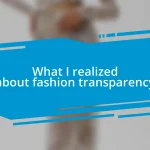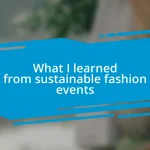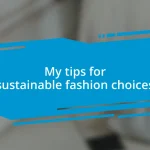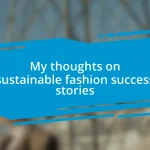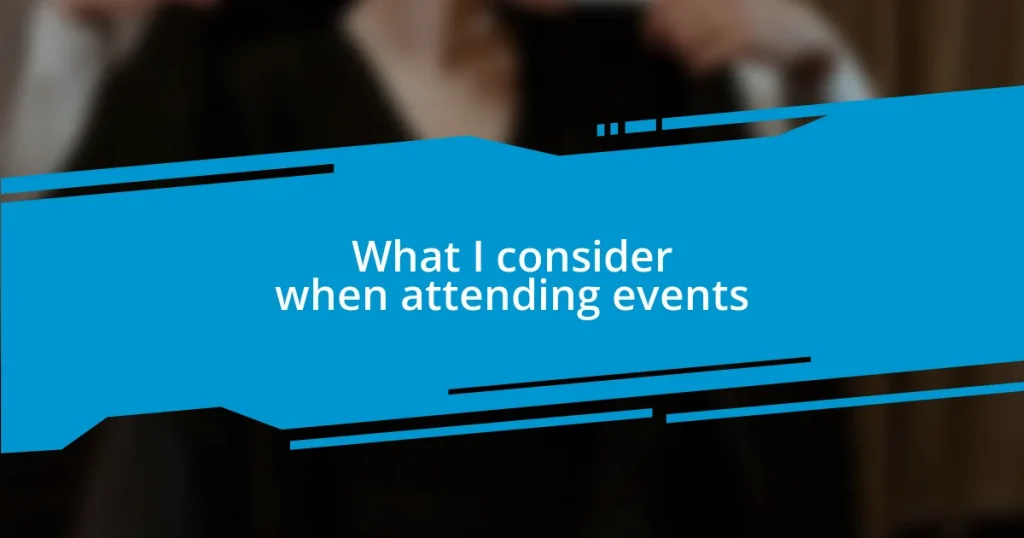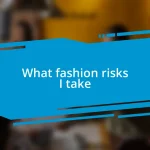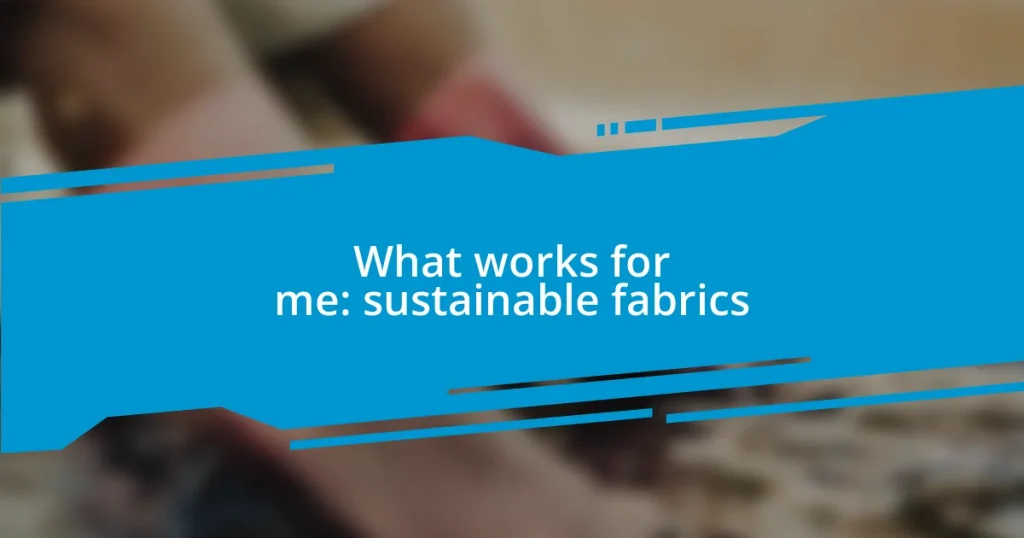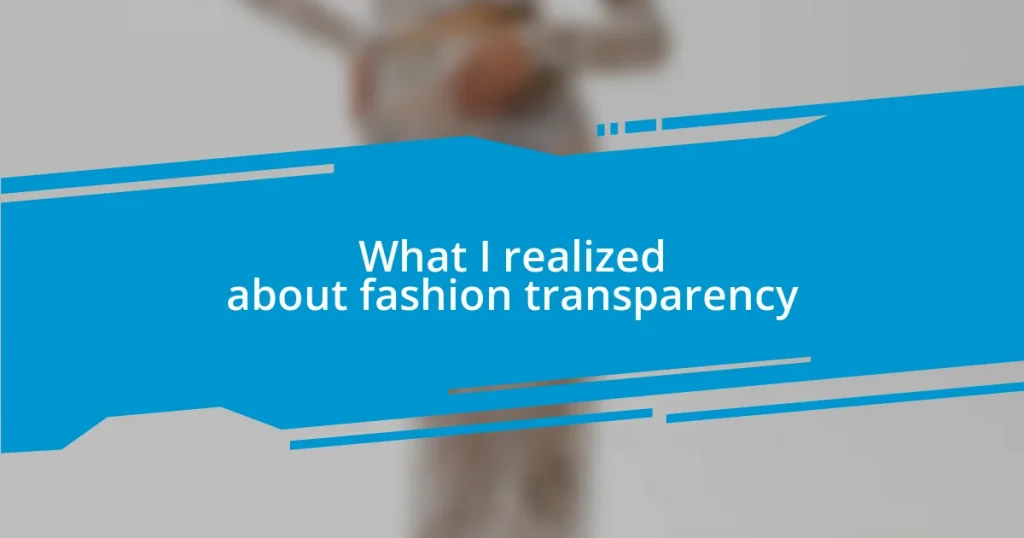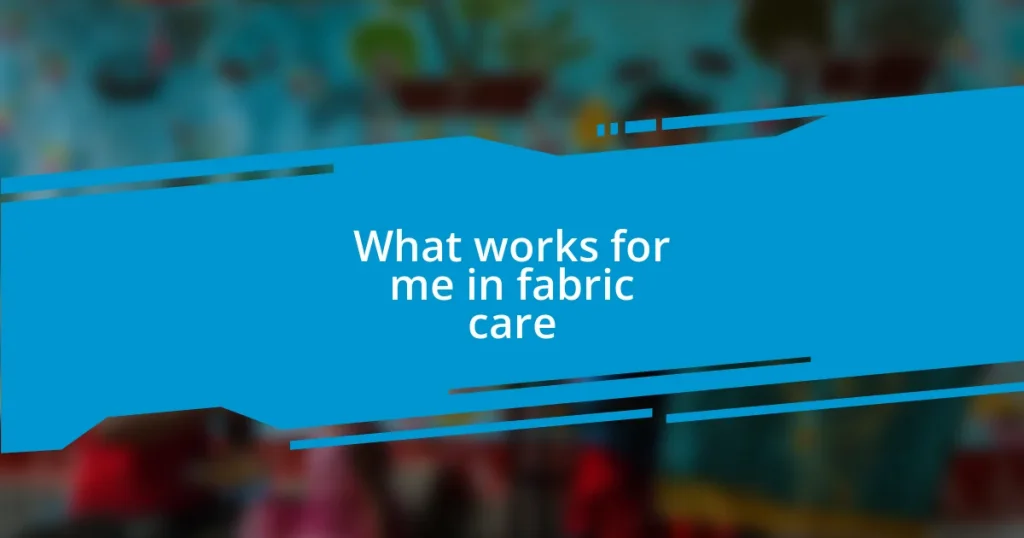Key takeaways:
- Setting clear goals before attending events can enhance engagement and lead to meaningful connections.
- Choosing the right event involves considering personal interests, format, networking opportunities, and accessibility.
- Following up after events helps solidify connections and can lead to future collaborations, emphasizing the importance of reflection and feedback for continuous improvement.
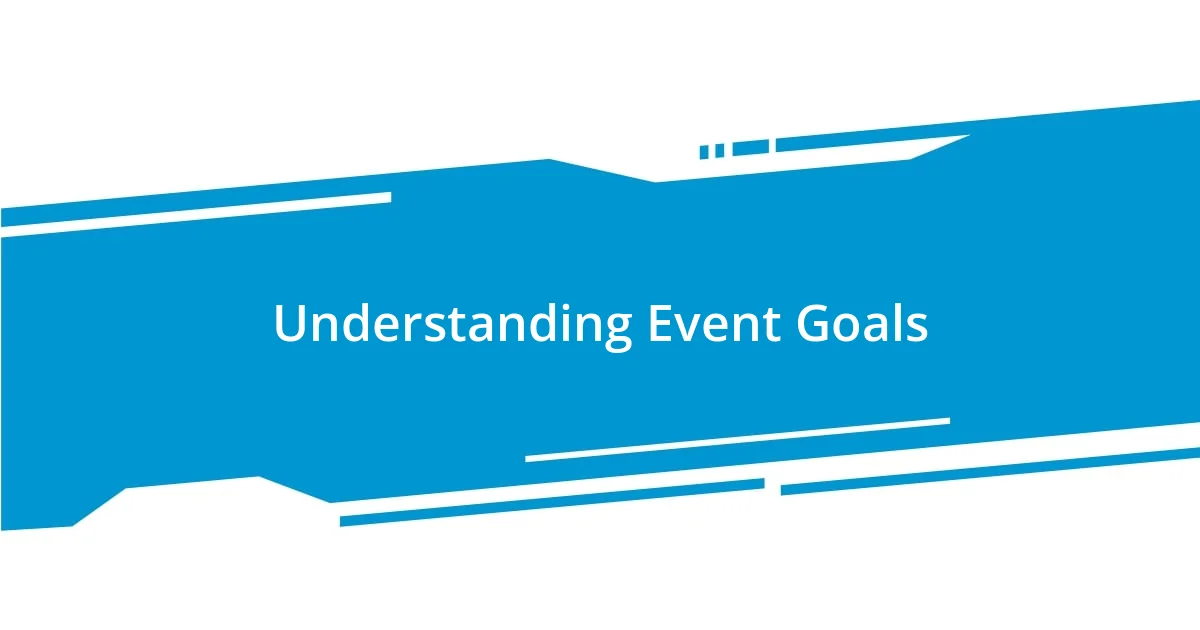
Understanding Event Goals
Understanding the goals of an event is pivotal for a meaningful experience. I often ask myself, “What do I hope to gain from attending this event?” When I attended a local art exhibition, my goal was to connect with artists and inspire my own creativity. Reflecting on those intentions helped me engage more deeply with the artwork and the conversations around it.
As I dive into an event, I consider not just the surface-level objectives, but also the underlying motivations. For instance, at a networking conference, I realized that the real value lay in building lasting relationships rather than just collecting business cards. It reminded me of a time when I sat down for a casual chat over coffee with someone I met at an event—it turned into a collaboration that still flourishes today.
By defining clear goals, I can align my actions to make the most of each opportunity. Whenever I approach an event, I keep a mental checklist of what I want to achieve; this clarity transforms a chaotic atmosphere into a focused journey. Isn’t it empowering to think that understanding our objectives can shape our experiences so profoundly?
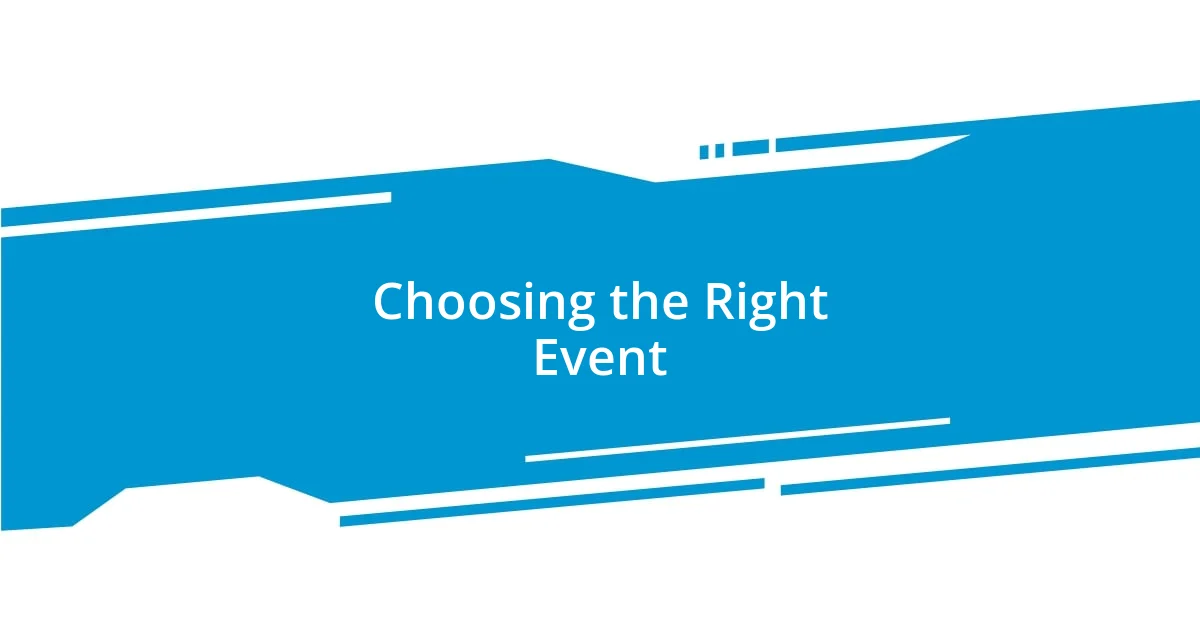
Choosing the Right Event
Choosing the right event often feels like navigating a maze. It’s essential to weigh your preferences against what the event offers. I remember feeling torn about attending a tech summit or a creative writing workshop. Eventually, I chose the workshop. It resonated with my passion for storytelling and allowed me to connect with inspiring individuals who shared similar interests. That decision led to friendships that enrich my life even today.
Here are a few key factors I consider when choosing the right event:
- Relevance: Does the event align with my interests or professional goals?
- Format: Am I comfortable with the event’s structure—workshops, panels, or informal meetups?
- Networking Opportunities: Will I have chances to connect meaningfully with others?
- Location and Accessibility: Is it easy to get there, both in terms of logistics and cost?
- Past Experiences: What have others said about this event in previous years?
Taking these elements into account enhances my likelihood of having a fulfilling experience at any event.
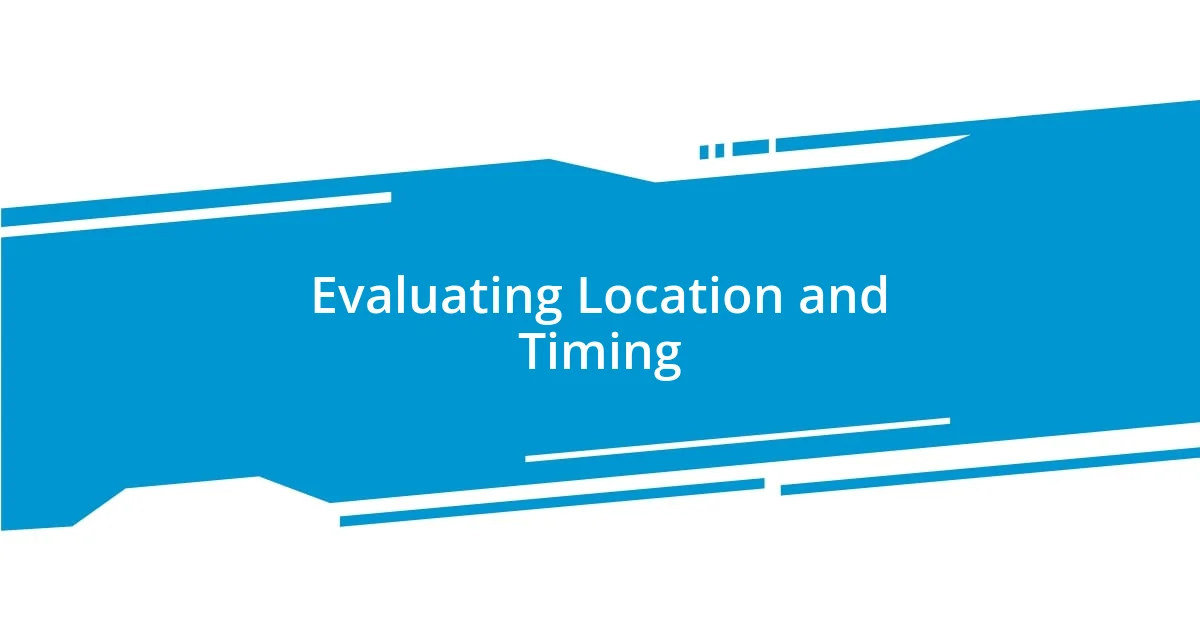
Evaluating Location and Timing
When I evaluate the location and timing for an event, I often think about convenience and ambiance. Does the venue create the right atmosphere for the type of event? I vividly recall attending a seminar in a bustling downtown area. Although the topic was fascinating, the noise and chaos around us made it difficult to focus. Conversely, I’ve enjoyed events in quiet, inspiring spaces that promote creativity and connection. The environment plays a crucial role in the experience, doesn’t it?
Timing is just as vital as location. I remember when I opted to attend a conference held on a weekend, which, in hindsight, was a double-edged sword. On one hand, it allowed for a relaxed atmosphere; on the other, it competed with family gatherings. I learned that fitting an event into my existing commitments ensures I can fully engage without feeling pulled in different directions. It’s all about the right balance.
Another aspect I consider is accessibility. Is the location easy to reach by public transport, or will I be stuck in traffic? I once drove across town for an event only to find I couldn’t find parking. It was frustrating and made me late. Reflecting on those experiences, I’ve come to appreciate how thoughtful planning regarding location and timing can save me a lot of stress and enhance my overall event experience.
| Factor | Consideration |
|---|---|
| Location | Is the venue inspiring and conducive to the event type? |
| Timing | Does it fit within my personal and professional commitments? |
| Accessibility | How easy it is to get there without hassle? |
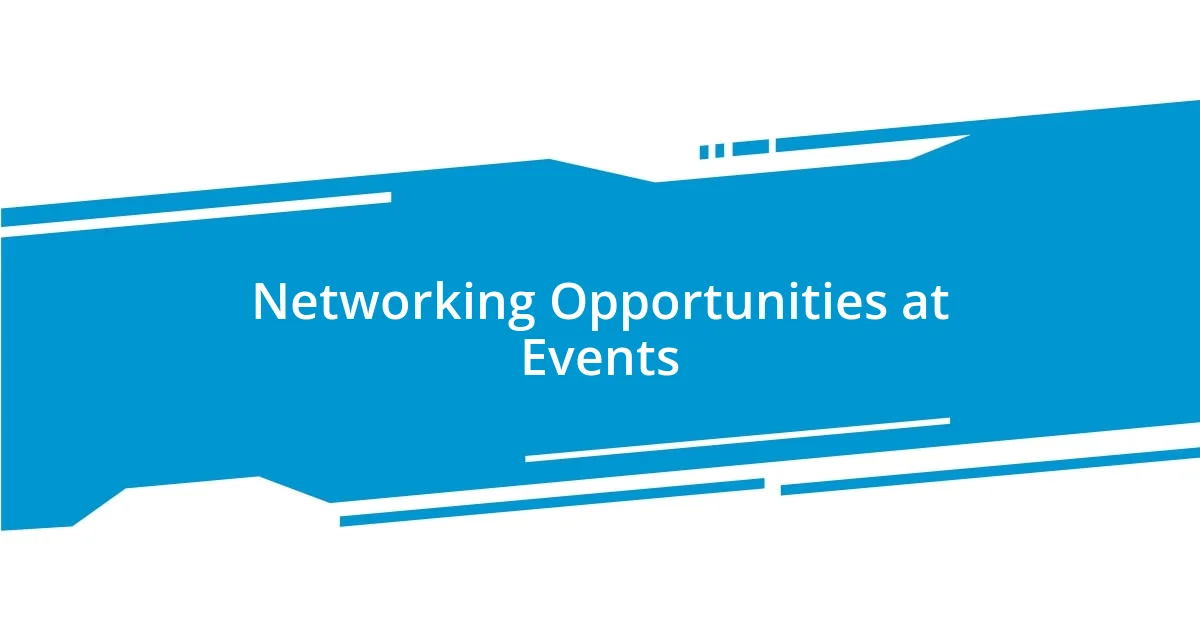
Networking Opportunities at Events
When I think about networking opportunities at events, I often reflect on how these interactions can shape my professional journey. Recently, at a local entrepreneurship event, I struck up a conversation with a speaker who turned out to be a key player in my industry. It was unexpected but invigorating, showing me that sometimes the best connections happen serendipitously. Doesn’t it make you wonder what opportunities might arise from putting yourself in the right environment?
Another aspect I treasure is the chance to connect on a more genuine level. I recall a small, informal meetup where the atmosphere felt less like a corporate grind and more like a friendly gathering. Sharing ideas over coffee rather than in structured panels allowed for authentic exchanges. These moments often lead to lasting relationships, don’t you think? I find that it’s these sincere connections that often expand my network more effectively than rigid networking sessions.
Finally, I always evaluate the event’s mix of attendees. At a recent industry conference, I was thrilled to meet people from diverse backgrounds—each bringing a unique perspective. We had engaging discussions that not only enriched my understanding but also opened new doors for collaboration. Engaging with a varied crowd at such events is essential; it encourages learning and growth. How do you decide who to connect with at these gatherings? I often find that authentic curiosity leads to the most fruitful relationships.
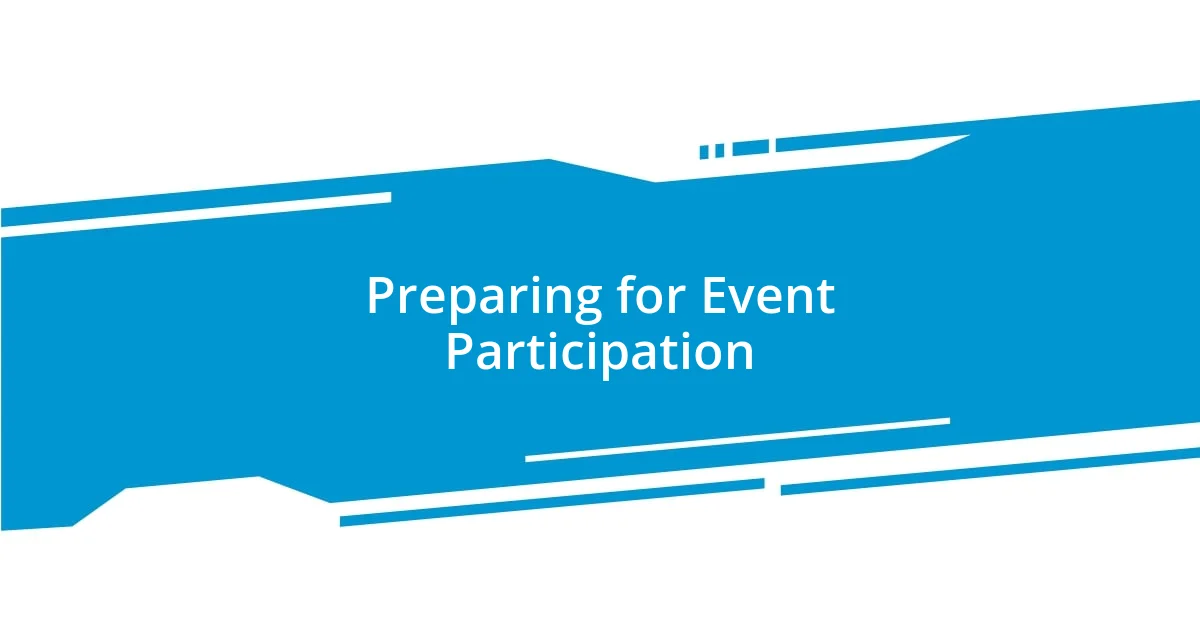
Preparing for Event Participation
Preparing for an event involves meticulous planning, and I’ve learned to assess my goals beforehand. For instance, before attending a workshop on personal branding, I made a list of specific questions I wanted answered. This preparation not only sharpened my focus during the event but also ensured that I left with valuable insights tailored to my needs. Have you ever considered what you truly want to take away from an event? I find that setting intentions enhances my overall experience significantly.
Another crucial step in my preparation is researching the agenda and speakers. I remember attending a tech conference where I came across a speaker profile that piqued my interest. It turned out that this person was a pioneer in sustainable technology. Armed with this knowledge, I was able to tailor my questions during the Q&A session, which led to an engaging dialogue. Preparation like this really enriches the experience—don’t you think that knowing about the presenters amplifies our engagement?
I also ensure I bring all necessary materials to the event. There was a time when I forgot my business cards at a networking event, and I felt so unprepared. It felt like missing an opportunity to connect with like-minded individuals. Now, I always check my bag the night before to avoid that sinking feeling. Being prepared at every level allows me to be present and confident, helping me enjoy every moment without distraction. How do you prepare to ensure you’re making the most of your time at events?
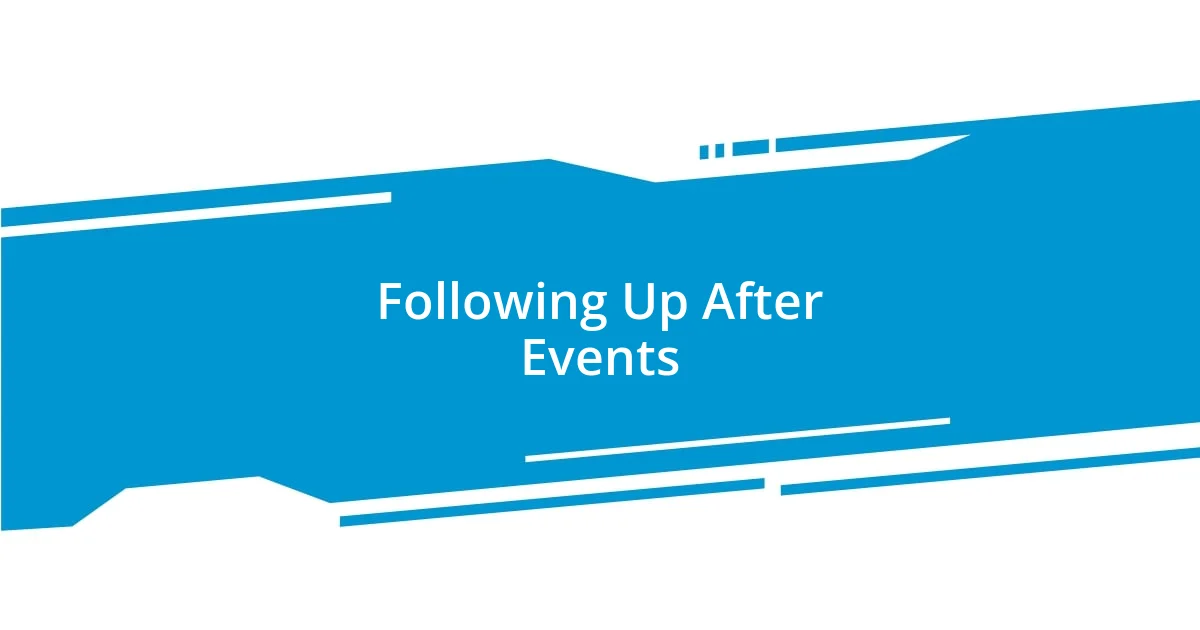
Following Up After Events
Following up after an event is just as essential as the experience itself. I remember attending a vibrant networking event not long ago. After the event, I made it a point to send personalized messages to individuals I had meaningful conversations with. This simple gesture not only solidified our connection but also laid the groundwork for future collaborations. Have you ever wondered how a quick follow-up can reignite the sparks of a great conversation?
The act of reaching out, in my experience, goes beyond mere politeness; it’s a strategic move. Sometimes, I find myself referencing specific topics we discussed to remind them of our interaction. For instance, after a fascinating chat about market trends, I sent over a relevant article I found later. This not only demonstrated my genuine interest but also positioned me as someone who values their insights. Isn’t it amazing how a small act can deepen a professional relationship?
In addition, I’ve come to appreciate the importance of adding new contacts to my network in a purposeful way. After an event, I often reflect on the conversations I had and how they might intersect with my current projects. I keep a digital notebook where I jot down these thoughts, which helps me track potential partnerships or collaborations down the road. Have you ever tried this approach? The clarity it brings to my networking efforts is invaluable, reminding me that every connection has the potential to lead to something greater.
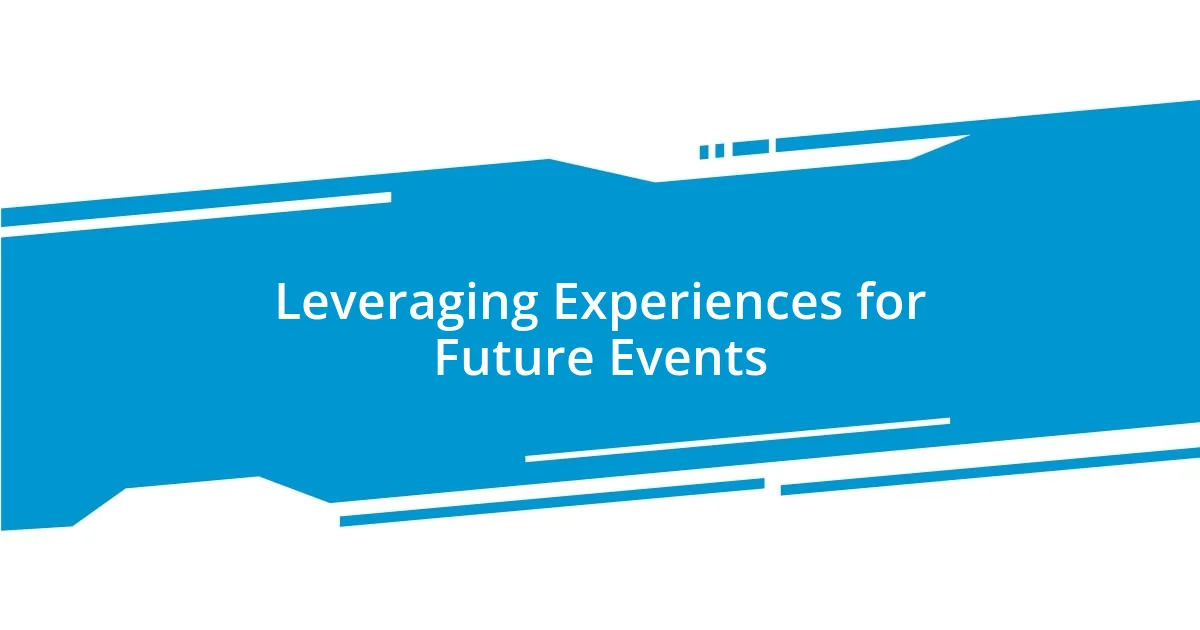
Leveraging Experiences for Future Events
Reflecting on my experiences from past events often shapes how I approach future ones. I vividly recall attending a leadership summit where I discovered my passion for effective communication. After that event, I made a conscious decision to engage more actively in discussions, even when it felt outside of my comfort zone. How important is it to step outside our comfort zones to grow? For me, embracing that challenge has opened up a wealth of opportunities.
I also recognize the power of feedback from past event interactions. Recently, after a series of panel discussions, I was brave enough to ask for constructive criticism on my interaction styles. The insights I received were eye-opening, revealing quirks in my communication that I hadn’t noticed before. Have you ever paused to consider how feedback can refine your approach? Incorporating this feedback into my future engagements has made my interactions more impactful and genuine.
Lastly, I find that the lessons learned can guide my decision-making process for selecting future events. For example, having attended a creative writing workshop that felt poorly organized, I now prioritize events with well-defined agendas. The experience was frustrating initially, but it ultimately honed my ability to discern quality offerings. Isn’t it fascinating how even disappointments can guide us toward better choices in the future? Each event serves as a stepping stone, enriching my toolkit for selecting the best potential experiences ahead.

